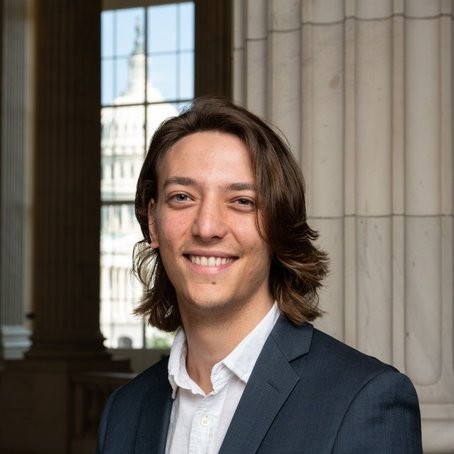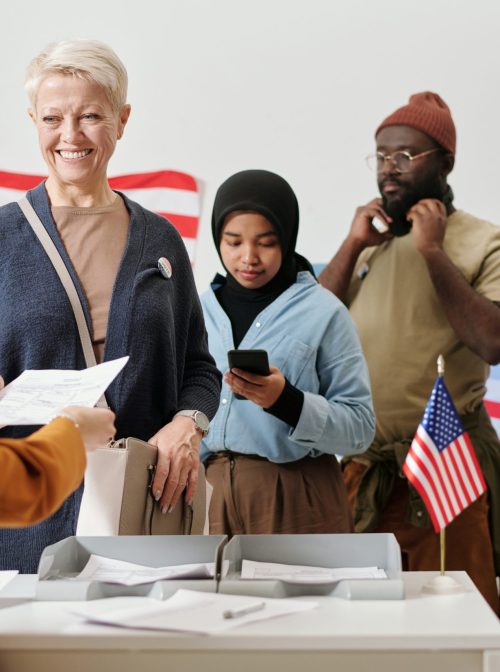For some, the fact that the 2024 election is now less than twelve months away will evoke a sense of optimism about the opportunity to change the future for the better. Many others will shudder when reminded of the vitriol that the previous presidential election brought about in their neighborhoods and online spaces alike.
At the risk of sounding like an election time cliché, the stakes are particularly high this time around, especially for the health of American democracy. A NPR poll from December 2022 found that 83% of Americans believe there is a serious threat to democracy, showing similar numbers from both ends of the political spectrum. This is a response to unprecedented levels of polarization in an era of an increasingly partisan Congress and continuous threats of authoritarianism putting stress on our nation’s democratic process.
People of faith, who not only wrestle with their political convictions but spiritual ones as well, are often left questioning what role they can play in restoring trust in our democratic systems and bridging the divides with their communities. That is why on November 2, Interfaith America and Protect Democracy have teamed up to launch the Faith in Elections Playbook, a comprehensive digital guide of nonpartisan strategies faith-based institutions can take to safeguard elections, defend democracy, and mend divisions.
Learn more
In my years as a congressional staffer before joining Interfaith America, I traversed across the suburban Minnesota district engaging in a multitude of discussions with a variety of local stakeholders, including houses of worship. I saw firsthand how the common principle shared by each religion to care for your neighbor because of their inherent value leads these institutions to contribute tremendous service towards the common good. Clothing donated for refugees, condos built for homeless veterans, kids fostered in loving homes. However, I also observed these commendable service-oriented ethics strained and fractured by tension within communities spurred by political ideologies and deeply held opinions.
Despite these differences on policy preferences, many religious leaders, regardless of their ideological disposition or the political culture of the congregation they serve, recognize how paramount a free democracy is to bulwark religious liberty and protect freedom of expression. This county has benefitted from a robust tradition of faith leaders from every generation who have stood up to the forces working to weaken these liberties. Still, the complexities of the modern challenges that spiritual leaders face today make safeguarding this democracy in a nonpartisan way, inclusive of a diversity of perspectives, challenging to put into practice.
The Faith in Elections Playbook addresses this need for resources tailored to communities of faith and calls them to action. It offers faith-based organizations and campuses accessible methods to support the administration of the election impartially, ensuring it runs smoothly without favoring any political candidate.
Inside the Playbook, readers will find instructions for recruiting poll workers, offering space for a polling site, combating disinformation, engaging with election officials, and ways to make voters comfortable while they go to vote. It also provides detailed resources for faith-based and ethical organizations on deep listening across differences to create better understanding through interfaith discussion. Whether your organization is seasoned in civic engagement, like of the committed organizations highlighted in the guide, or is just getting involved for the first time – the Playbook can offer support.
A fair, free, and safe democratic election does not just happen automatically. There is no system of governance or set of laws that can guarantee that American citizens have the trustworthy information and accessibility needed to ensure their ability to cast a vote or that the results are trusted to be impartial and accurate. This civic infrastructure that empowers each individual voice to be heard is built – one committed citizen at a time – with each community stepping up to preserve America’s almost 250-year streak as the oldest continuous democracy in the world.
Interfaith America founder and president Eboo Patel says that “the signal achievement of American democracy is having different identities and divergent ideologies living together in a common civic and political community. This is rare in human history, and it needs to be cherished, protected, and strengthened.”
As a Christian who feels led to step into the public square as an avenue to love and to serve, I see positive civic participation as a way people of faith can respond to Eboo Patel’s call to action throughout the next year. By raising your hand to offer your time and thoughtful effort to safeguard our democracy in this turbulent period in history, you can help this nation live up to its potential as a pluralist society – one that celebrates our differences and protects our neighbor’s right to have a voice, even when we disagree.
Download the Faith in Elections Playbook to share it with your community.
Support Free and Fair Elections

Rollie Olson
Rollie Olson is a program manager at Interfaith America. For five years Rollie served as Congressional staff for Congressman Dean Phillips (MN 03) focused on stakeholder outreach, constituent services, and finding common ground with constituents across backgrounds and ideologies. He has degrees in International Relations and Political Science from Bethel University and is completing an MPA from Metro State University in St. Paul.




